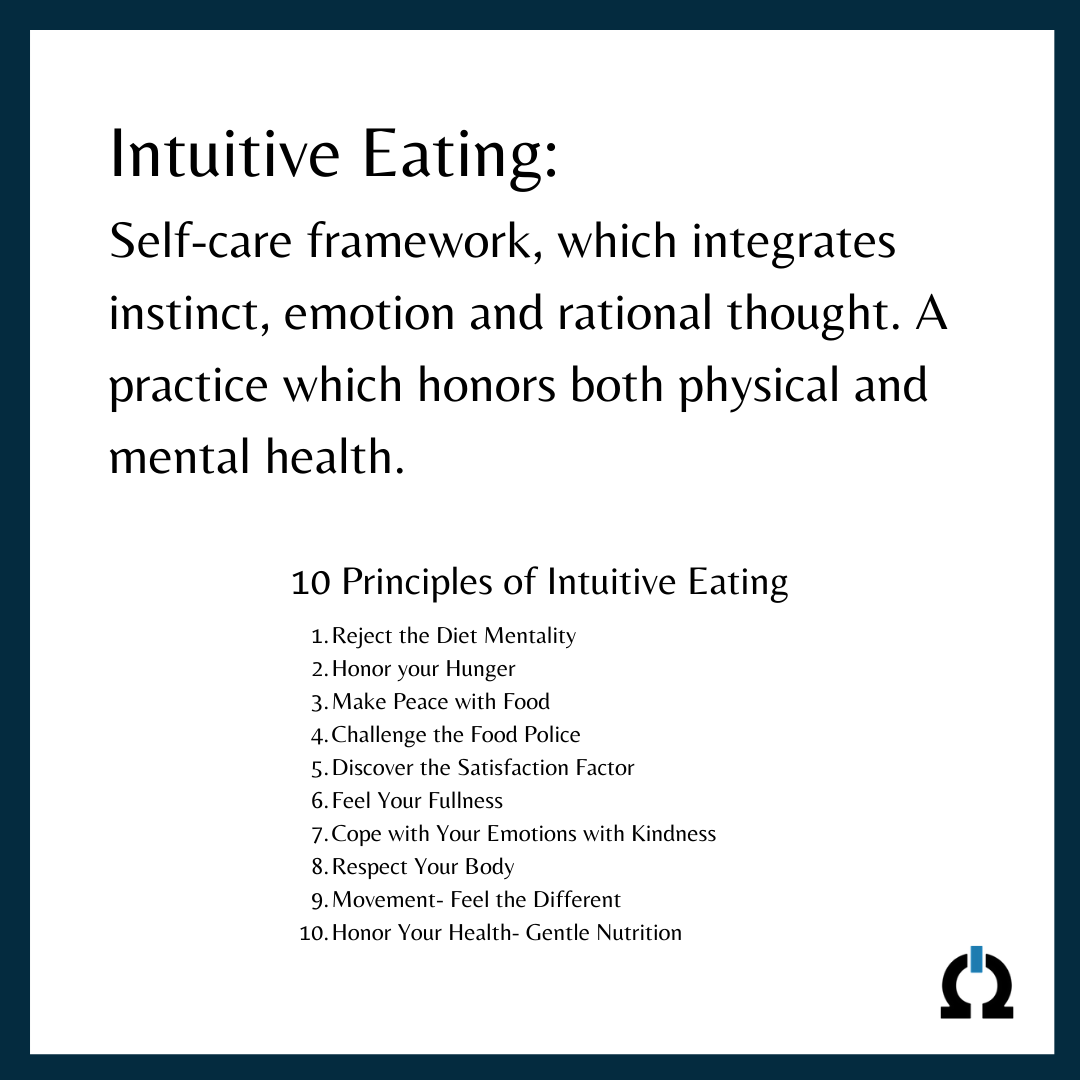As the definition describes, intuitive eating is a self-care framework that brings together the concepts of instinct, emotion and rational thought to honor both the physical and mental health surrounding food, weight and diet. The broad concept of intuitive eating is built on 10 main principles:
- Reject the Diet Mentality : You need to get upset at the ideas presented by diet culture- those that promote weight loss and the lies you are told that make you feel as though you have failed every time a new diet stopped working or you gained back the weight you lost. There is no healthy way to loose weight quickly, easily and permanently. If you hold onto hope that you will find a diet or food plan that will provide these answers, it will prevent you from discovering Intuitive eating.
- Honor Your Hunger : When you keep your body properly fed with the adequate amount of macronutrients and micronutrients, you prevent the primal drive to overeat. Once you reach the moment of excessive hunger, all of the intentions surrounding moderate, conscious eating are gone and irrelevant. When you learn to honor your hunger in its first stages, you start to rebuild the trust in yourself and your relationship with food.
- Make Peace with Food : Give yourself unconditional permission to eat. If you tell yourself that you can’t or shouldn’t eat a particular food, it can lead to intense feelings of deprivation that can lead to uncontrollable cravings and often times, bingeing.
- Challenge the Food Police : Get rid of the thoughts in your head that declare you’re “good” for eating minimal calories or “bad” for eating dessert. “Food Police” monitor all the unreasonable rules that the diet culture has created. All of these rules and thoughts are housed within your thoughts and come out as negative thoughts, hopeless phrases and guilt-provoking situations.
- Discover the Satisfaction Factor : When we try to follow diet culture, we give up the most basic gifts of our life – the pleasure and satisfaction that can be found in the eating experience. When you eat what you want and in an inviting environment, the pleasure that you will feel will be a powerful force in helping you feel satisfied and content.
- Feel Your Fullness : In order to honor the fullness you feel, you need to trust that you will give yourself the foods that you desire. Listen to your body for the signals that you are no longer hungry. Observe the signs that show that you are comfortably full.
- Cope with Your Emotions with Kindness : You first need to recognize that food restriction, both physically and mentally, can trigger a loss of control, which in turn can feel like emotional eating. Find ways to comfort, nurture and resolve the issue. Anxiety, boredom and anger are all emotions that we all experience throughout life. Each emotion has its own trigger or triggers- food won’t fix these feelings. Eating for an emotional hunger may only make you feel worse in the long run, you ultimately need to deal with the source of these emotions.
- Respect Your Body : Accept your genetic makeup. Just as one person who has a shoe size 8 wouldn’t expect to squeeze into a size 6, it is equally futile to have a similar expectation about body size. Most importantly, respect your body so you can feel better and accept who you are!
- Movement- Feel the Difference : Get active and feel the difference! Shift your focus to how it feels to move your body, rather than thinking about the calorie-burning effects of exercise. If you focus more on how you feel, like more energized, it can help make the difference between sleeping in or that morning walk!
- Honor Your Health – Gentle Nutrition : Make food choices that honor your health, taste good and help you to feel good. Remember, you don’t have to eat “perfectly” to be healthy! You will not suddenly go into a nutrient deficit or become unhealthy from one snack, one meal or one day of eating! Progress, not perfection!

